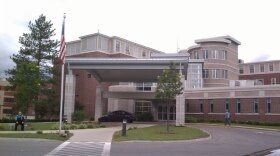Representatives of the roughly 66 workers who would be eligible to join the Massachusetts Nurses Association delivered a letter to administrators at the Berkshire Visiting Nurses Association Wednesday.
“I would certainly hope that they see the increasing demand and need and understand that we are united front as to going forward with the union, and only – I don't seek to strive any discontent, and I know that the overwhelming majority of people who are with us don't either,” said registered nurse Sarah Roberts.
The workers gave Berkshire Health Systems, which owns and operates the BVNA, one day to voluntarily recognize their push to unionize before they formally filed for an election with the National Labor Relations Board.
“We're actually seeking partnerships with them, believe it or not," said Roberts. "We really would just like a voice for not just ourselves as staff, but also our patients and the family members that are involved. And we desperately would like to work together, and not to file an election, not to have any sort of contention with this. We have an overwhelming majority of our coworkers who have chosen to be backed by a union at this point, and I think that that's very important.”
Nurses and healthcare professionals got their response Thursday.
“Every employee should have a voice in deciding whether an outside third party will represent them," said BHS spokesperson Michael Leary. "And Berkshire Health Systems has not, and will not, recognize any labor union without first giving all of the affected employees the benefit of a free, fair, and confidential election, and an NLRB-supervised election, we feel, is the best way to do that.”
“Their statement is a little frustrating. It’s sad, it’s disappointing," said Tamaryn Clowdus, a physical therapist with the BVNA. “They say they want to give us a voice and they're doing just the opposite. We had a voice, we presented the cards, we've shown them what the nurses and healthcare professionals want, and they're choosing to ignore it once again. And now they're going to delay this whole process, they're going to have to spend more money. We know that there's not a ton of money in health care, and this is the last place that I feel they should be spending money. And we should be able to move forward with this process and start to come to an agreement so we can put the money where it needs to be for better health care for patients.”
BVNA workers travel to patients’ homes to offer services ranging from managing medications to wound care to long-term recovery from injury or ailment.
Clowdus says quotas imposed on workers by management disregard distance traveled and the range of time and attention each patient requires.
“I do have to give it to management, they're in a very tough situation," she told WAMC. "Healthcare is exceptionally difficult to negotiate. During this time period, period, Medicare is making cutbacks. There, they're doing more audits. So it is challenging. But they're going down the route of least resistance to figure out how to do this. And that's just putting more and more work onto the healthcare professionals out in the field. And we are getting put into situations where either we have to work all night, or we have to cut back on patient care, which we're not doing, but it's what it's starting to feel like and we've had several committee meetings with the management, we have been trying to voice what the problems are, we want to try to help come up with solutions. They always listen to us to a point, but when any real change, it's just not happening. And we don't have the power to try to push them to make it happen. So this is what has brought us to this point.”
For Clowdus, the bid to unionize is the inevitable end result of years of frustration between workers and management at the BVNA.
“There’s no leeway, no flexibility, and it just, it all falls on you," she said. "So it just becomes it becomes this whole other level of stress that I don't think anybody else can understand. And in the hospital, people can see if people are working longer hours, they can see if they just had a triage, a very stressful case, and then they can immediately start helping. And when you're out in the field, no one can see that. Nobody can see the mothers who are trying to feed their children and do a charting because they had a patient who almost died on them that day so they weren't at home an extra hour. So it's a little bit harder- "
She paused as her voice broke.
"I'm getting emotional. It's a little bit harder to get empathy from people out there. From management, from the community.”
BVNA employees have now formally filed for a union election with the National Labor Relations Board after BHS’s rejection. BHS has been a WAMC underwriter.









